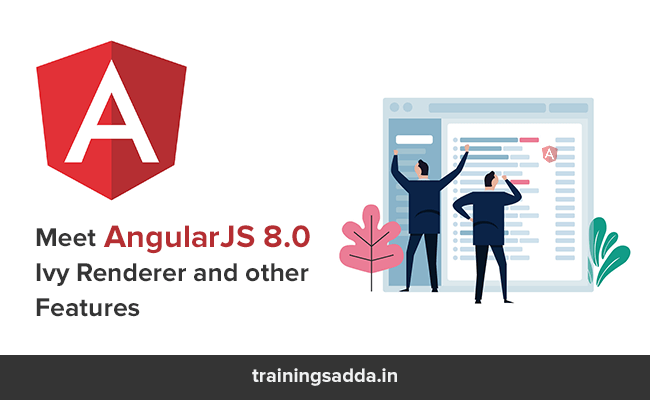What Is AngularJS 8.0, Ivy Renderer and other Features

Last Updated on January 6, 2020 by admin
When Google launched Angular, developers from around the world had embraced this TypeScript-based, open-source web application framework for creating dynamic web applications (websites that can dynamically change data/information subject to specific parameters).
Technology tends to evolve, and angular front-end technology is not different from that change cycle. Angular web framework, since its launching, had undergone diverse cycles of versioning processes.
Read more: What’s New in AngularJS 8.0 Features, Performance and Challenges
Table of Contents
The semantic versioning of Angular framework
AngularJS
A JavaScript front-end framework also called Angular 1.
Angular 2
The rewritten version of AngularJS, uses a component-based approach.
Angular 4
It uses patterns and concepts like its predecessor, Angular 2.
Angular 5
Saves developer’s time from codes-redundancy in apps. It has DOM support.
Angular 6
Much improved version for creating an angular web component.
Angular 7
Released on October 18, 2018, it features app performance among others.
Angular 8
The latest version of Angular, released on May 28, 2019.
One of the greatest features for which the latest version of AngularJS is grabbing eyeballs is it’s Ivy Rendering Engine.
What is AngularJS 8.0?
AngularJS 8.0 is the latest and major semantic versioning of Angular. It is a TypeScript-based, open-source web application framework that comes loaded with many new features while helping production users to maintain the stability and reliability of the platform. One of the greatest improvements in this latest versioning of Angular is the Ivy compiler as an opt-in feature, which is said to be the most anticipated update of the web framework.
Know more: Which one Should you use for JavaScript Framework Showdown?
Features of AngularJS 8.0
- Supports TypeScript 3.4
- Supports Web Workers
- Has Ivy Rendering the Engine as a new compiler
- Provides dynamic imports for lazy loading feature module of Angular
Angular 8 comes loaded with a variety of workflows and powerful features aiming to entice developers to adopt the technology into a core framework, command-line interface, and angular material library. Some of the partner launches it has enabled include a framework called NativeScript for creating Angular-based native mobile apps, a new console called Angular Console for funning Angular projects on a system, StackBlitz (an online IDE for Angular), and #angular/fire that enables integration of Firebase with Angular.
Preview of Angular Ivy
The angular developers have been working on Ivy renderer for over a year, the prime reason behind increasing the speculations surrounding this unique feature of Angular 8. One of the reasons behind such boosted hype refers to the fact that there was no official release of Ivy, even though the developer team of AngularJS had talked about it on various occasions in the past. Now, with the release of Angular 8 that includes Ivy renderer as an opt-in preview, the confusion very much seems cleared off, except it’s not a final release. But then again, a preview shades off more lights on the compatibility of Ivy with regard to any current Angular apps work.
In the legacy of angular versioning, Ivy is considered a radically different change from anything, because it provides DOM supports. The change brings about is being a catalyst in the internal working module of the framework, without introducing any change to an Angular application. The basic thing about the Ivy project is rewriting the Angular compiler and runtime code to conclude building more compatible sizes with tree-shaking, reaching better build-times, and lazy loading of the component.
Read more: Best Tricks For Using AngularJS in your web development projects
Please note that Ivy is just a preview version of Angular 8 available for testing and so, it’s avoidable for using in production.
Angular Ivy Benefits
It is a big question if a developer should care about Ivy or not, but if you are very much focused on the user experience of your applications, then consideration of Ivy matters. You can derive the following benefits from Ivy:-
- Complex codes generated by Angular compiler can now be understandable for humans.
- Faster rebuild times.
- No more times were taken by browsers to download and parse a web application, due to an enhanced payload size.
- Template type checking is better now; thereby enabling you to detect more errors at build time and help users not to encounter the errors during runtime.
- Better compatibility with existing angular browsers. Therefore, no need to change your apps to maximize all of Ivy’s benefits.
- Faster rebuild times.
- Introduction of Meta programming in Angular.
In addition, the possibility of encountering some bugs and hiccups is always there. Hence, build your existing Angular app based on the version of Angular 8 and Ivy.
Main components of Ivy
Tree-shakable – This concept involves eliminating codes which are no longer useful, thus allowing more time for codes in use by the application. This facilitates faster runtime and smaller bundles.
Local: This concept involves the recompilation of mutable components to allow for faster compilation.
Additional changes with Angular 8

Differential Loading of Modern JavaScript
Talking about additional changes in Angular 8, one of the crucial changes is ‘Differential Loading of Modern JavaScript’. It means that discrete bundles for legacy JavaScript (ES5) and modern JavaScript (ES2015+) would be the constituents of new apps created by Angular CLI. Because of this distinct change, downloading smaller and more capable app bundles via modern browsers supported by modern JavaScript bundles ES2015 it would be easier.
As self-explanatory it may sound, modern browsers would have improved loading speed and better time to interactive (TTI).
Takeaways from differential loading of modern JavaScript
- Supports modern browsers for more optimized bundles
- Supports older browsers with legacy bundles
- Ensures load optimization for browsers to download the right set of bundles
- Enables process automation with CLI extension
Backward Compatibility Mode
The backward compatibility mode to the angular router will ensure that there is no issue encountered regarding upgrading any legacy angular apps to a modern Angular. The benefit it derives here is that developers will find it easier to migrate to Angular when they permit lazy loading parts of Angular v1.x apps using the $route APIs.
Know more: 10 Essential Skills Required For Angular Web Developers
To say otherwise, there will be no hassle while upgrading our Angular v1.x apps to Angular 2+ instantly.
This could also mean a death knell for Angular v1.x, considering there will be no new development for it, except some security patches until June 30, 2021, which culminates expiration of its long-lasting support duration.
Opt-In Usage Sharing
This new feature of Angular 8 telemetry in CLI will enable alignment with the community’s needs. This would also allow Angular 8 to start collecting data, such as commands used and the build speed if permitted by the users. Based on the information on how developers’ experience was with Angular 8, a better version of the same will be developed in the future.
Improved web worker bundling
The role of web workers is essential in improving the parallelizability and application’s performance. The building supports to CLI by Angular 8 would make it possible for every work worker to have one bundle.
Support for TypeScript 3.4
This is a crucial upgrade to Angular 8 for creating readable and clean JS codes.
Know more: Python Best Practices and Tricks
Deprecated APIs and features
Certain features and API’s from Angular have been removed to ensure that there is no problem in updating Angular with latest practices, altering dependencies or any chance in the platform itself. This is for the purpose of balancing novelty and stability in the Angular web framework.
And to make sure that this transition continues without a hiccup, APIs and features have been deprecated for time duration until they are terminated. In the meantime, developers will be allowed to update your apps to the latest APIs and best practices.
Builders API
Builders API relies on builders to carry out operations, such as serve, build, test, lint, and e2e. It is basically a function to bring logic and behavior into implementation for replacing a command, for example running the linter. Input and a context are two arguments that a builder receives to provide communication between the CLI and the builder.
Bazel support
This is a build tool facilitating creating CLI application with Angular 8. Developed by Google, this is functional in all the language input. You can use it to build the front end and back ends, and run tasks that are necessary.
Migrating to Angular 8 from Angular 7
To update from Angular 7 to Angular 8 is simple for those who have upgraded HttpClient to RxJS6.
Things to consider involve – run the $ node-vcommand to ensure the kind of Node version you’re using. Consider version 12 of Node.js or later upgrade. Syntax errors could emerge due to TypeScript 3.4. Run the command: $ ng update @angular/material to update the Angular Material in-app.
Conclusion – Should You Update To Angular 8?
Angular 8 is a great web framework with grand IVY features, among others. Our verdict is to go for this upgrade to utilize applications of Ivy, performance boosts with differential loading, and no-breaking changes in the updates so that your existing apps can get along well without any changes. Though Ivy is just an opt-in preview in Angular 8, still you should better upgrade to Angular 8, considering if Ivy becomes the default in a later version of say, Angular 9 or 10, then your apps would stop working. Therefore, updating to latest Angular js version is always a recommendation for the performance viability of your apps.
Author’s Bio:
The author of the above blog post is Pranay Agrawal, a co-founder of MobileCoderz Technologies that is a trusted mobile app development company based in India. He is renowned for his proficiency in business consulting as well as strategy building. He loves writing informative blogs on technologies & trends in the mobile app world.
Comments
0 comments
![How To Fix or solve the [pii_email_bbc3ff95d349b30c2503] Error Code?](https://www.trainingsadda.in/wp-content/uploads/2020/10/How-to-fix-pii_email_bbc3ff95d349b30c2503-Error-Code-390x220.png)

![How To Fix [pii_email_cbd448bbd34c985e423c] Error Code?](https://www.trainingsadda.in/wp-content/uploads/2020/10/How-to-fix-pii_email_cbd448bbd34c985e423c-Error-Code-390x220.png)

